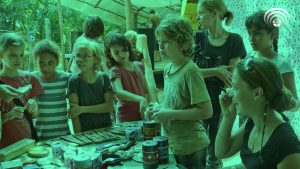Auroville, often referred to as the City of Dawn, serves as a living testament to the potential of the clothing and textile industry to embrace sustainability and ethics. This article delves into how Auroville’s textile sector leads the way in producing garments from sustainable fabrics, while championing ethical fashion practices. It highlights how these efforts align with the community’s commitment to eco-conscious living, responsible consumption, and promoting a fashion industry that prioritizes people and the planet.
Auroville’s Commitment to Sustainable Fabrics and Ethical Fashion: Sustainable fabrics and ethical fashion are at the core of Auroville’s ethos, reflecting the community’s dedication to eco-conscious living and responsible consumption.
Innovative Textile Materials: Auroville’s textile industry actively seeks out innovative and eco-friendly materials, such as organic cotton, bamboo, and natural dyes, for sustainable and ethical fashion production.
Ethical Production: Auroville’s textile units prioritize ethical production practices, ensuring that the fashion industry respects fair labor practices and empowers its workers.
Local Artisans and Craftspeople: Many of the textiles in Auroville are handcrafted by local artisans and craftspeople, promoting ethical fashion while supporting the livelihoods of nearby communities.
Eco-Friendly Dyeing and Printing: Auroville’s textile industry adopts eco-conscious dyeing and printing methods, minimizing chemical use and reducing environmental impact.
Educational Initiatives: Nurturing Informed Consumers: Auroville’s educational institutions play a pivotal role in educating students about the importance of sustainable fabrics, ethical fashion, and responsible consumption.
Community Impact: The textile industry in Auroville has a significant impact on the community, promoting ethical practices, eco-conscious living, and supporting local artisans and workers.
A Model for the World: Auroville’s approach to sustainable fabrics and ethical fashion extends beyond its own borders. The community actively shares its experiences and insights with other regions and communities worldwide, serving as an inspiration for a fashion industry that prioritizes sustainability and ethics.
Auroville’s message is clear: the clothing and textile industry can embrace sustainability and ethics, producing garments from sustainable fabrics while championing ethical fashion practices that align with the community’s commitment to eco-conscious living, responsible consumption, and a fashion industry that values people and the planet.
Conclusion: Auroville’s textile sector serves as a powerful example of how the clothing and textile industry can prioritize sustainable fabrics and ethical fashion practices. The community’s message to the world is that sustainable fashion is not just a trend but a way of life, one that respects the environment, empowers people, and promotes a brighter, more ethical future for all.



